TRANSCRIPTION
What are your earliest childhood memories?
I was 4 or 5 years old. I can remember everything. It brings me sadness because those days things were hard, extremely hard because we didn't have anything to eat. There were days when we didn't have anything to eat sometimes only a glass of milk and that was because my uncle had some cows and would give my mother some milk everyday. Mostly all the time, I remember seeing my mom going out walking out to the brush area where we lived to gather mesquite and wood and would carry it on her back. She would come home and make a fire to cook the nixtamal, because she cooked the nixtamal then she would grind it in a molino and that's where she would make the corn tortillas from. Every now and then maybe she would make us an egg or beans, but I don't recall us ever eating soups or nothing fancy. I just remember the tortillas with salt.
How life in Mexico & how were your living conditions growing up in Mexico?
Very very poor. It was seven of us, but at the time there was only six because my older sister was living in the United States. My mom use to get on her knees to make some corn tortillas. She used to give us one corn tortilla to each of us with salt because that was what we were going to eat that day. My father was working in the United States so my mother had to figure out how and where our next meal was going to come from. My mother was an American citizen, she was from Knippa,Texas and my father was in the US working as an illegal alien when they met. They had my oldest sister in the US and then my father took my mother back to Hacienda de Guadalupe, Coahuila Mexico. He would come to the U.S. and then go back and every time that he would go back he would get mom pregnant. My brothers and sisters are all three years apart. I don’t know how mom would manage. Would my dad send her money? I don’t know. What I do remember was when he would arrive. We were always apart from him. We were in Mexico and my dad was in the United States as a bracero. The ranch owner for whom my father worked for help my family cross over. My father was in the bracer program. Until we crossed over in 1953 when we all were declared legal residents. The house we lived in was made out of adobe, it was a box, in one corner there was a chimney. Our table was a piece of plywood, our beds were pieces of plywood and we would throw the blankets on top of it, the floors were dirt. We use to take the water out of a well with a bucket tied to a rope. I remember that the restroom was an outhouse made out of adobe. They would make holes in the ground and that was what we would use as a restroom. We would go bathe nearby in the Ogo de agua (water would run and pour out of the ground). That’s what they would call it from where I am from. It was the root of the water and that’s where it would start. In the winter months mom would bring water home and bathe us in a bucket of water. I would stand in the center of the bucket. She would warm up the water and then pour it over us. She would repeat this with the five of us at that time.
.
What was it like growing up in such a large family? What role did you play?
It was normal for us. We were use to that if my mother would give us one corn tortillas and we were satisfied. If my uncle would bring the milk she would give each of us a little glass of milk. Most of the time we would only have one meal a day.
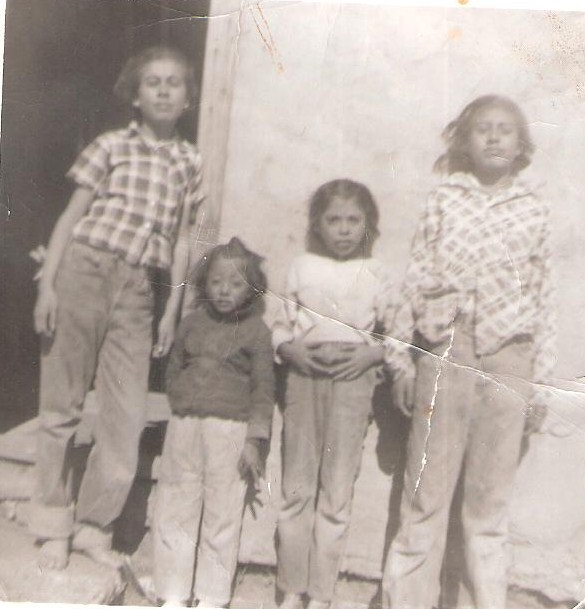
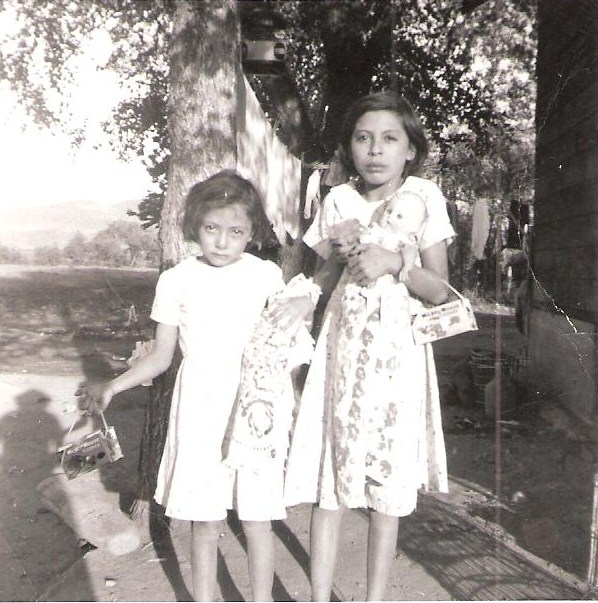
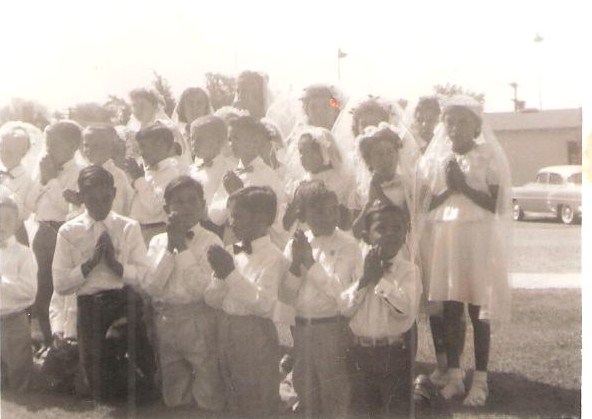
How old were you when you began to work? Did you attend school? Where?
I was twelve years old. We crossed over in 1953 to Eagle Pass, Texas. My mother’s brother lived there and so we lived there with him. At that time, my father began to work the night shift for the City of Eagle Pass, Texas. His job was to measure the level of water in the Rio Grande River. He had to keep an eye on the water; there was some type of pumps that he would monitor. That’s when I was able to enroll in Webster Elementary School which is now called Deluna Special Education. I only had three dresses and one pair of shoes. I would shove a piece of cardboard in the soul of my shoe because they were so worn out I would get a hole at the bottom of it. So to avoid from the dirt getting into my shoe I would do that. I went first, second, third and fourth grade. During that time, my sister got married and her husband’s father had people going to work in the fields up West, they had big trucks. We would come from Eagle Pass to Carrizo Springs, Texas on Sunday’s to the landfill to search for cans to bring back and sell. Our goal was to fill up the big truck. We would walk and move all the trash around looking for cans. The smell was unbearable. There was maggots and bugs and all sorts of awful stuff. Then my sister and her husband moved to Carrizo Springs and then that’s when my parents decided to move there too. When we arrived we moved in with my sister and her husband and we lived there for a while. After a while my parents rented a house there in Carrizo and we moved into it. I was able to enroll in fifth grade in Carrizo Springs for about a month or so. The house my parents were renting was small and along with my family living there my brother and his wife and child, two of my sister and their husbands also lived there with us. We all lived under one roof. When my other sister Lusia got married to her husband she moved with him to the ranch where he was working as a migrant worker as a bracero. At the same time, my older brother got into some trouble and was not able to work. I had to drop out of fifth grade to go work with my sister Lusia and her husband to help my dad with the house expenses because my bothers wife and child were now living with us too. At that time I was about twelve years old and my sister’s husband asked the ranch owner if I could work in the fields but he denied the request because of my age. He claimed that I was not even thirteen but my brother in law insisted telling him that I needed to work to her my father so he agreed with the condition that if we were to see a vehicle or someone coming I was to pretend that I was fetching water for the others. They did not accept kids my age working at that time.
What type of work did you have to do? What were the conditions like?
I worked with a hand held hoe cleaning onion when they planted it at .50 per hour. After that we were asked by other couple to go work in Michigan. A big truck would come pick us up at the house and two other families and we would go sitting in the back of the truck side by side in a row all the way to Lansing, Michigan to pick strawberries. When we were done with that we would start with the cherry. Then when we finished that we moved on to Adrian Michigan and Toledo, Ohio to work picking tomatoes. Finally, we would end up in Lubbock, Texas picking cotton. We would start in April and be done by the end of October and back to Carrizo Springs, Texas to work in the fields again. The total miles that we would travel every year in the back of that truck was just a little over 3,700 miles. We would work the carrot, cabbage, bell pepper and anything that we could work in.
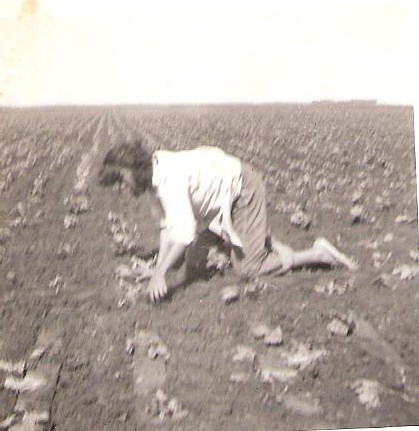
Did your whole family work? If not, who did and where were the others?
No, only my father and I because all of my older sisters and brother were married. The only ones that were left at home were my sister Jenoveva, my brother Tom and I. My dad would work in one place and I would work in another.
Did you live in the same place? If not where else did you live when your family left to go work?
Oh my (sigh) we worked in Traverse City Michigan, Adrian Michigan, Toledo Ohio, Payette Idaho, Lubbock Texas, Alamosa Colorado, Oregon, Grafton North Dakota, Greeley Colorado, and Brighton Colorado are some of the places that I can remember. I don’t know how much we would get paid; Dad would take care of all that.
How were the living conditions at these places where your family stayed at while you all worked?
There were many families living under one roof at a time. In Traverse City, Michigan the houses were quite big with eight to nine rooms and each family would occupy one room. The ranch owner would drop off several sacks like bags the size of a mattress and instruct us to go to the barn and fill them up with hay and those would be our mattress for the bunks that would be our beds. For weeks the hay would poke us all over until we would mold them. There would be a little convenience store nearby that would give each family credit for food and every payday we would go settle up. There would be bathrooms and showers one for men and one for women. We had to hurry because the hot water would run out fast. Nobody wanted to be last because you would have to wait for the water heater to warm up the water again. (laughing) On Sunday’s the bosses loved to drink beer and would tell us that we were having a dance, she would take out the record player and who ever wanted to dance could dance on the dirt floor. Thinking about it now it was hard but I didn’t know any other way so I didn’t complain.
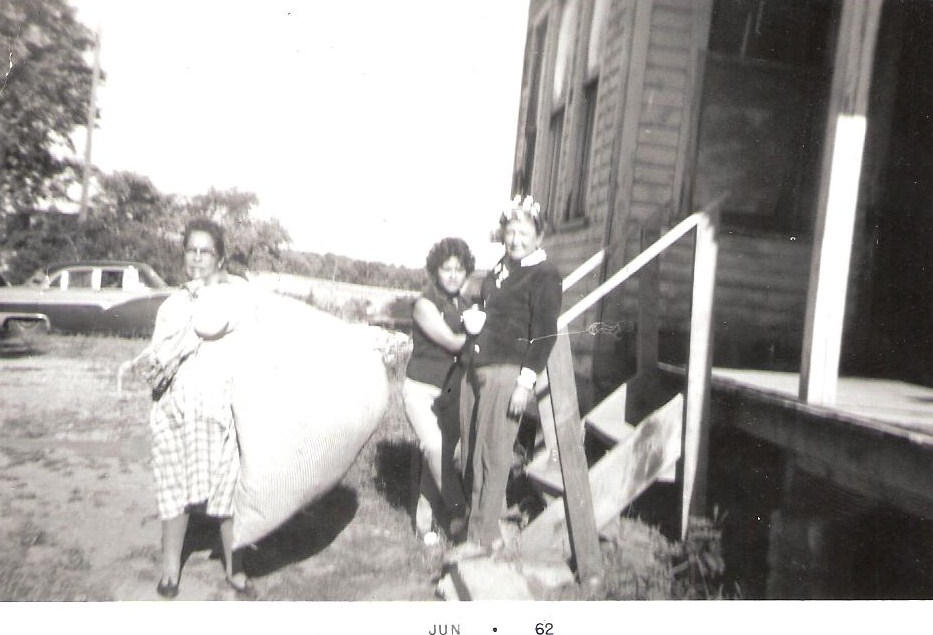
When you were working in the field, describe an average day of work from the time you woke up until you went to bed?
There were no breaks, if you were hungry you would get out of the fields and go eat what you would take for lunch. We ate on the ground and once you were done eating if you wanted to rest a bit all you would do was just lay back on the ground for a bit. We had a habit that we would all eat around noon time. I remember when we were working in the beets in Greeley, Colorado we knew it was coming up on 12’oclock because a plane would fly over us everyday coming out of Denver exactly at 11:30. (laughed). When we worked in the potatoes the tractors would be plowing the field by four in the morning. We had to be there by sunrise to pick up the potatoes and by noon we were done picking them up. When we worked the sugar beets we would work from seven to seven because we would get paid by the acre not by the row.We were never home, we were always working. My mother would stay at the house except when we would go up north. Everyday and all the time it was about working in the fields. We would finish one type of crop and move on to the next one. We would get up in the morning and by the time we would get up my mother already had breakfast for us and while we were eating breakfast she was making up our lunch and packing it up for us. We would go off to work, come back and she would have dinner waiting for us. We would eat dinner, bathe and go to sleep and that was it and then the next day do it all over again…..same routine. So I never had the chance to learn to cook until later on because I always worked like a man.
How much would you and your family get paid; Did you get to keep any of the money?
I don't know how much we would get paid; Dad would take care of all that. The bosses would pay the head of the family. Sometimes I can remember my mother on different occasions giving me ten dollars or so for me. I could buy anything I wanted with that. I would buy fritos and Coca-Cola.
What would your family do for transportation?
Well, I remember the big trucks would come pick us up at our house. When my dad worked for a rancher, he would drive to Carrizo Springs to pick up my dad because dad did not have a car or truck. He would go stay with the ranch owner up to a month sometimes. Then he would come back and drop him off. Eventually, my father bought his own car with the earning we got from going up north. Back then some of the land owners well sell their old cars to the people who were working the fields. My dad paid around $300 for his first car in 1959. I don't remember what kind of car it was but I do remember that the doors opened the opposite way from today's cars. It was green. It was very hard for my dad to come up with that money back then but he did somehow. My father had gotten tired of people picking us up and dropping us off everyday. We always had to be waiting for our ride.
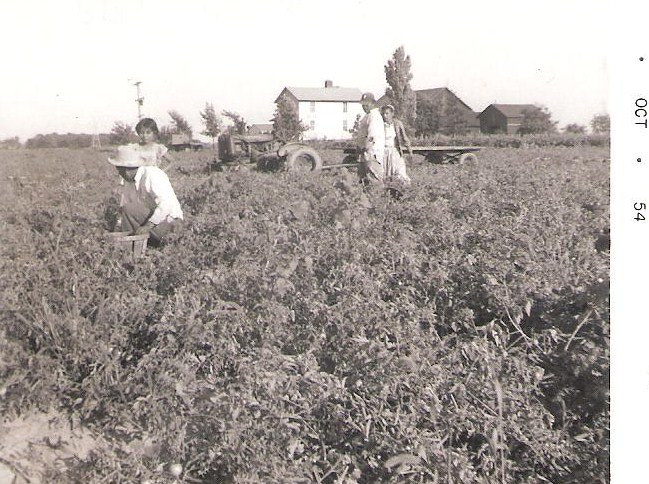
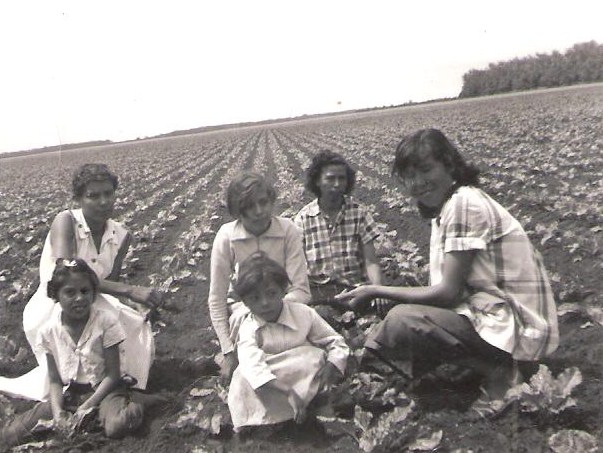
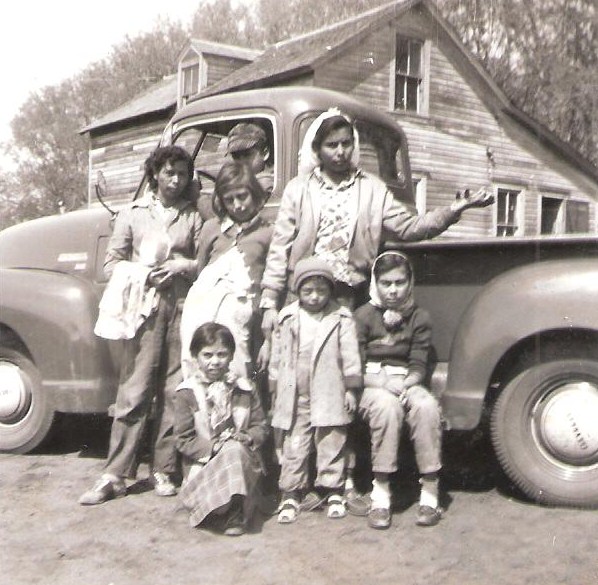
How did your dad treat you and your mother?
My father was ….mexicano macho; in Mexico they call the men that. These were the men who ordered you around or the men who were in charge. They don't care how things are, for example if that object is green and he would see it red, it was red then. My father was the type of person that it was his way like it or not. If I say you don't go then you don't go! My mother suffered a lot. I was the only one who lived the longest at home than my other siblings because some of them got married at fifteen. Right after I got married my younger sister married as well. I lived with my parents until I was twenty-two. My father started treating me different because he knew that I saw how he treated my mother. My mother has no say so. It was only my father's way. My mother was a very quiet person. She never complained. She always obeyed my father. As far as punishment….well let me just say that I was quiet often slapped in the face because I would stand up to him and defend myself. I never heard them argue but I knew my mother very well and when I would see her sitting there very sad, I knew something had happened. We were never allowed to ask for permission of any sort from my mother, If we wanted something or to go somewhere we had to ask my father, her standard response was "whatever you father says". I would ask him if I could go somewhere and he would reply when he was good and ready. If it was NO then it was NO! Sometimes my sisters had to beg him to allow me to go with them to the movies or anywhere, but it was always, No, no, no and that was final
Were you and your siblings allowed to do other things besides work? Examples (on a Sunday?)
Not very often…he was very strict. If I was allowed to go to the movies one weekend then the following weekend I was not able to go out at all because we had done it the week prior. I used his car to go work all week and sometimes I would pick up other people to go work and they would give me gas money but on the weekend when I would ask to borrow the car my father would tell me no because he was afraid that somebody might hit me or that I would be involved in a car accident…..I guess during the week that would not happen… (Laughing)
How did the owners or people in charge treat your family or others?
They were good to us but, as women workers we did not have any direct contact with them. All the dealing was done with the people who were in charge of taking us up North. We always went with certain people from Carrizo Springs that already had the contracts at these ranches. My father dealt with them not the ranch owners. I remember in Michigan, when we would go work in the strawberry fields, they would use some kind of duck like bird…they were white in color. Right after we were done working the strawberry, we would pick the field three times because after the third time the plant would not give anymore strawberries and after we were completed and right before we started picking the cherries you could see out into the fields and see all the ducks in each row like people cleaning the field. The ranch owners had them. The ducks would walk down the rows picking and eating the strawberries that were left behind. That was so weird and we never thought of taking a picture of them. But they did that. It was an amazing site. After that they ranch owners would plow the field. A lot of people would say I am lying but it's true. Anyways, it was not until later on that we went on our own and my father would find us work and he would have to speak directly to the owners of the land.
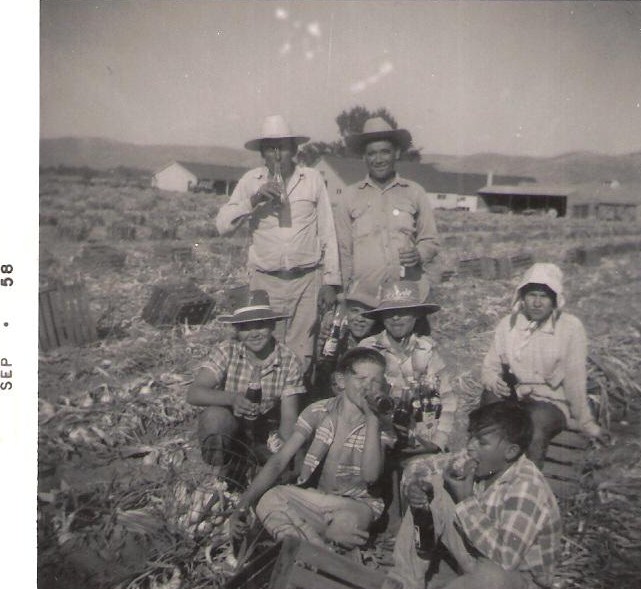
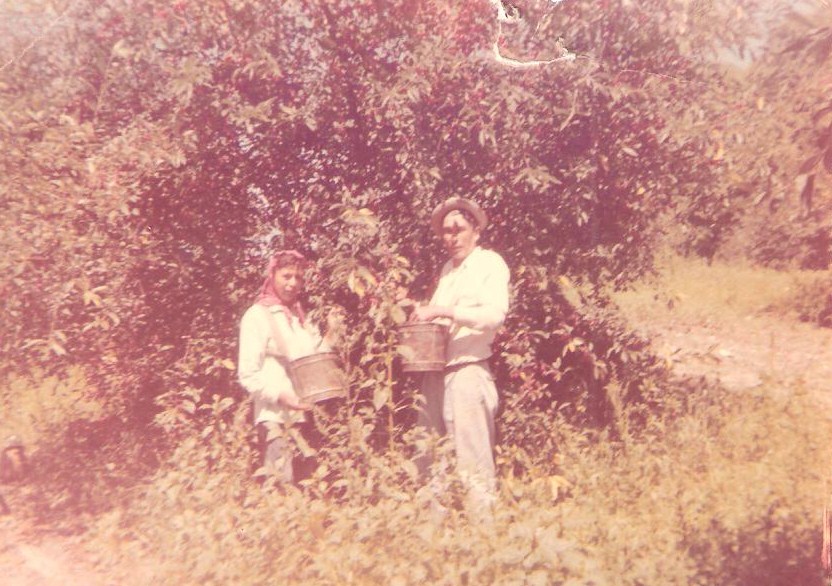
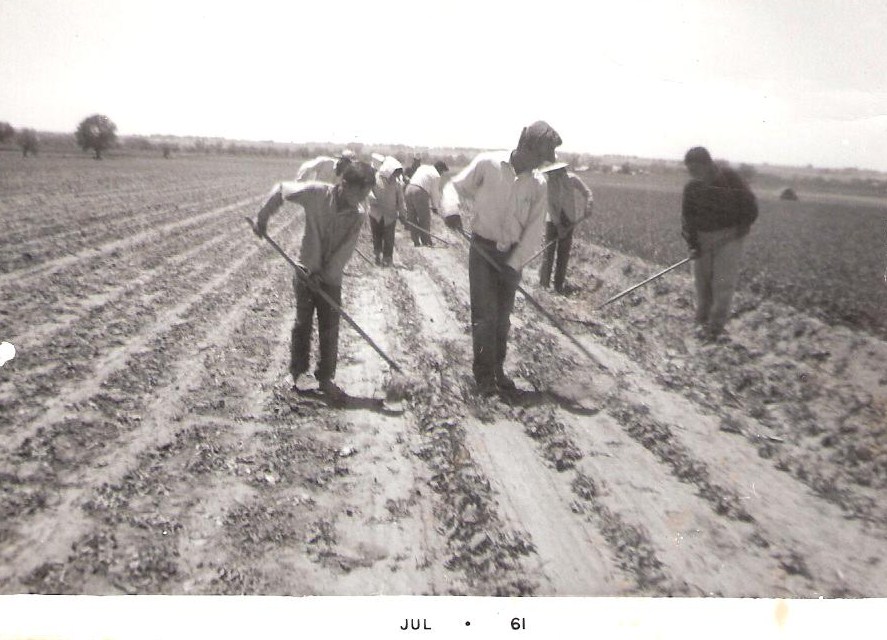
What did your family do when someone got ill?
My mother would give us all sorts of teas. The only way we would see a doctor was that you had to be very, very ill. My mother resorted to home remedies and prayer.
I don't recall any of us ever getting that sick except my mother one year while we were working in the potatoes fields. Maybe it was menopause…(pause) who knows. I never saw my father ill, either
Do you feel that your Health has been influenced by the working conditions as a migrant worker? In what ways?
Oh, yes most definitely. For example my arthritis is real bad! One day it happened to me when were working in Carrizo Springs in the fields and the ranch owner came and ordered everyone out of the field. We all went to our cars or trucks because the airplane was going to fumigate. Not even thirty minutes went by and we were instructed to continue working. This happened very often. They assured us that it would not harm us. Now that I am much older I think about it. All that chemical that they would spray who actually received it?…..us! They would spray and then we would walk into the field and cut down the plants that had just been sprayed, so really who was getting all that stuff. It wasn't the crop that's for sure. One day we were working in the onion field and all of the sudden I just collapsed; I just passed out, that was all. After a bit, I started waking up and I just continued to work. I blame my arthritis on the fact that we worked when it was so cold, it was unbearable and we would get wet up to our waist pulling the sacs of cotton with our body down each row weighting one hundred plus pounds in Lubbock, Texas around November. When we were working in the potatoes, we had these huge belts we would wear at our waist with two big hooks carrying twenty-five sacs on each hook. Aside from that, the board you had to carry, you would hook on a sac, open your legs, throw the sac between your legs and drag it throwing the potatoes inside of it bending down all the way to the end of the row. This had to be done fast. You tired to advance as much as you could. Once you were done you would pick up the sac, untie it from the hook and lay the sac down on the ground and grab the next one and do it all over again. This was done all day long …day by day. Your back would hurt you so bad.
Explain how you and your family crossed over to the United States?
My mom was an American citizen and my father was an illegal alien and when my parents met they had their first child in the U.S. soon after that my father took my mom back to Hacienda de Guadalupe, Coahuila Mexico. My mother would live there for the next fifteen years. My father would come to the United States to work and return every two to three years. Every time my father would come home he would get my mother pregnant. My mother had five children in Mexico. My father was working in the United States as a bracero when he decided to bring all of us over to the United States. In 1953 with the help of the ranch owner for whom my father worked for help my family cross over. Until we crossed over is when we all were declared legal residents. They took a photo of us together which was part of the documents they had to get. Thank God for that man who loved my father because without him who knows where I would be today. He requested us from Mexico as if we were his property.
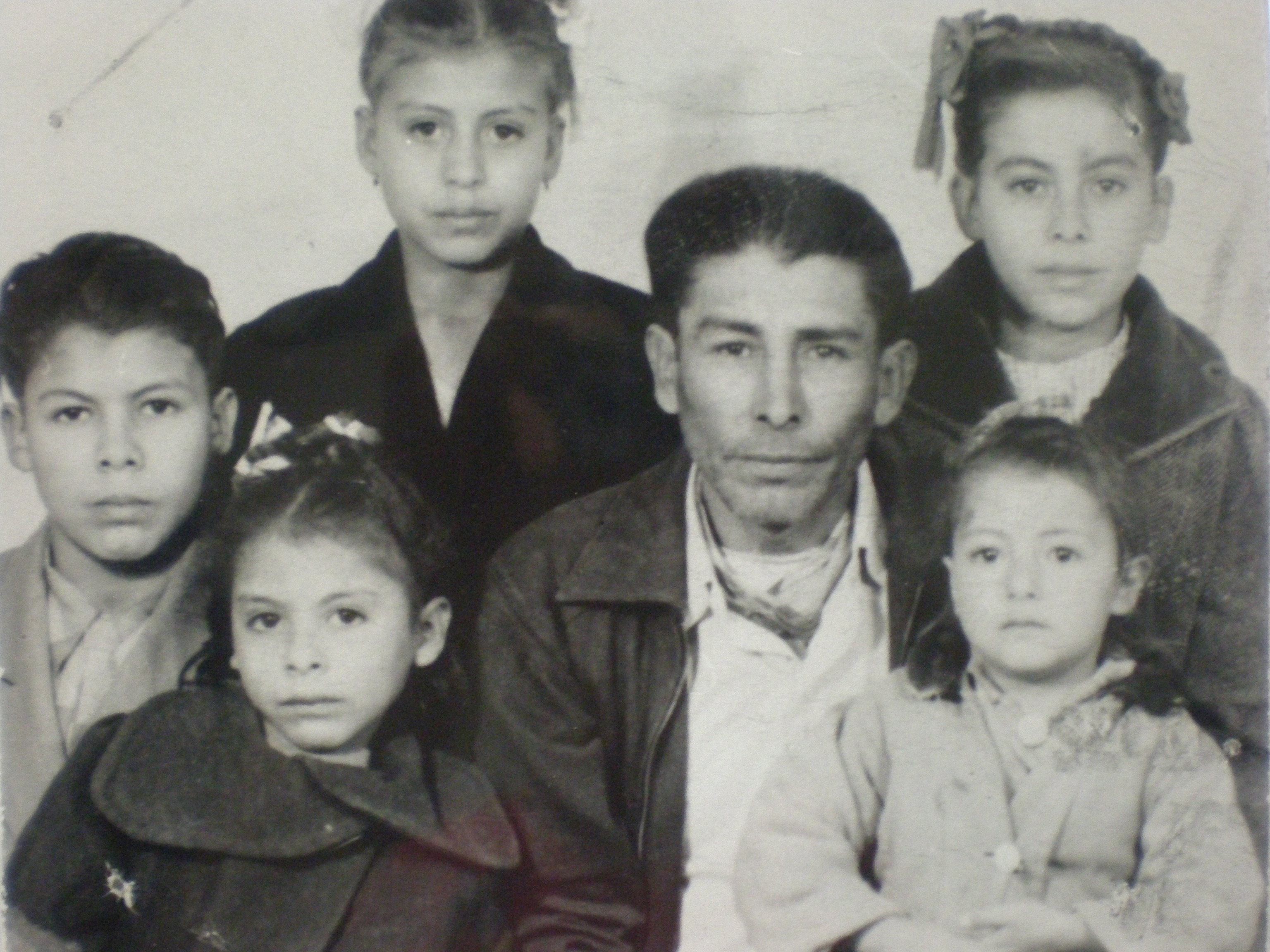
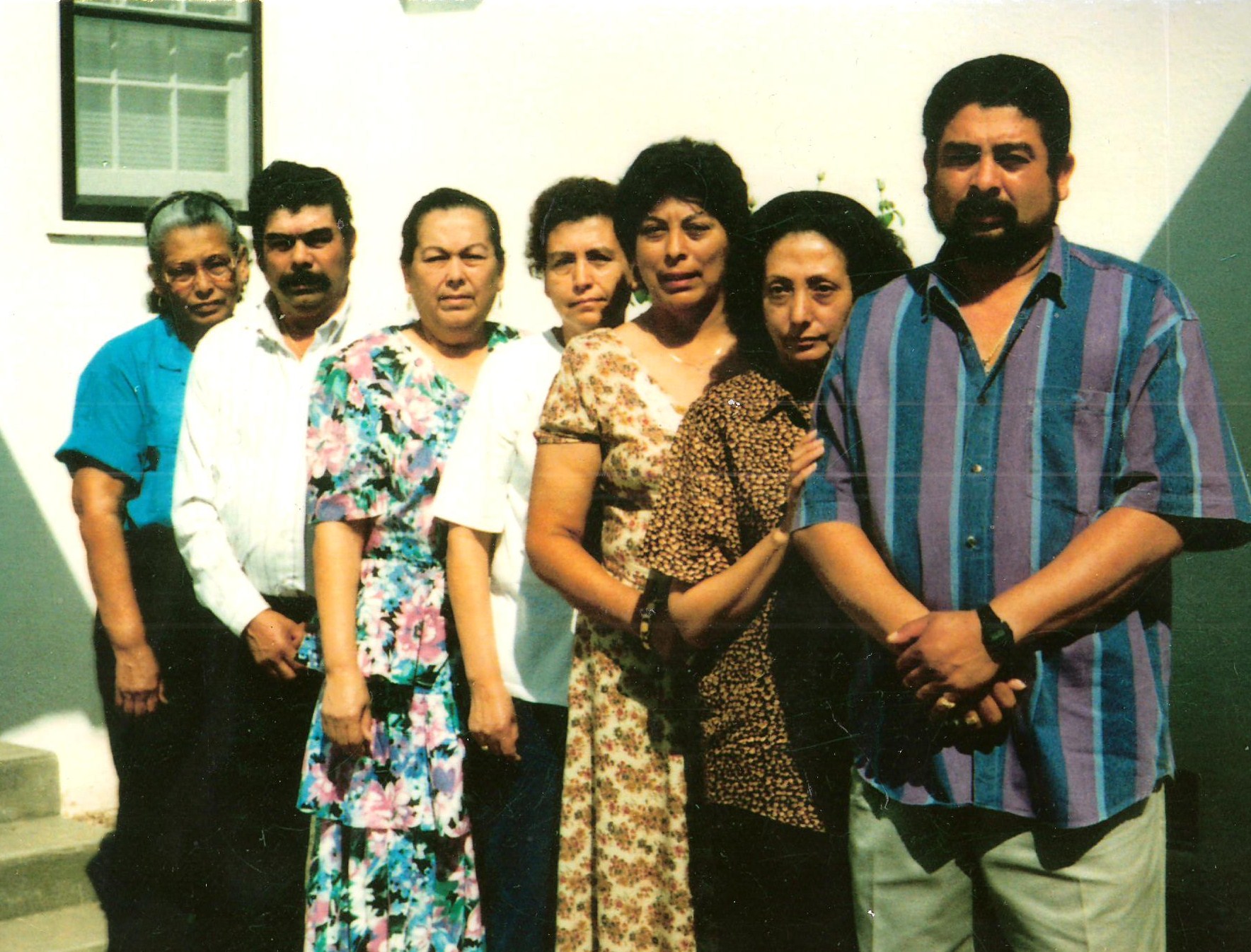
When and where did you meet Dad?
I met him in Carrizo, I was going to stand up in my friends wedding who was getting married and I needed an escort to stand up with me to present her with the cushions. My boyfriend that I had at that time was not able to stand up with me because he was working. So my sister told me that across the street a family had move there from Catarina, Texas and there was two brothers living there, the older one was named Domingo and the younger one was named Delfino. She asked me to go over to ask one of them to stand up with me. I walked down the street and knocked on the door and his mother came out and asked me what I needed and I asked her if I could speak with Domingo. I waited outside but I could see into the house threw the window and I saw someone pass by with a checkered shirt with orange squares on it, then I saw somebody else pass again, they both looked so alike, I asked myself which one was the older one, after a few minutes your dad walked outside and intruded himself to me and I told him that I was the sister of Josepha, the neighbor across the street. I explained to him that I had stopped by to ask him if he could stand up with me in a wedding. Right away he answered yes without hesitation. I told him that I would be letting him know when and where. We used a car that someone loan him and we decorated it with flowers and such. I would not go out much but we would go to the laundry mat in front of the court house to wash clothes, every chance we could get we would go wash; this was one way to get out of the house. My sister, two other friends and I would sit in the car and hang out in front of the laundry mat. One day we were all sitting in my car talking when a car pulled up behind mine and parked, it was your dad. He got off his car and started to walk up he came up to my window and squatted down by my side and started talking to me. From that day forth anywhere he would see me he would stop and talk to me. Finally one day he asked me to go with him to the movies and we did. There was not much to do in Carrizo but ride around or go to the movies. Your dad was very respectful. One day he told me "Look, I'm not playing any games with you and I have a while asking you to go out with me but, I know you have a boyfriend and I going to be straight forward with you, either you leave him or I will step aside and I will not bother you anymore." I really liked your father because he was so respectful and serious. I decided to end my relationship with my other boyfriend and stay with your dad. Our courtship was quick, less than one year.
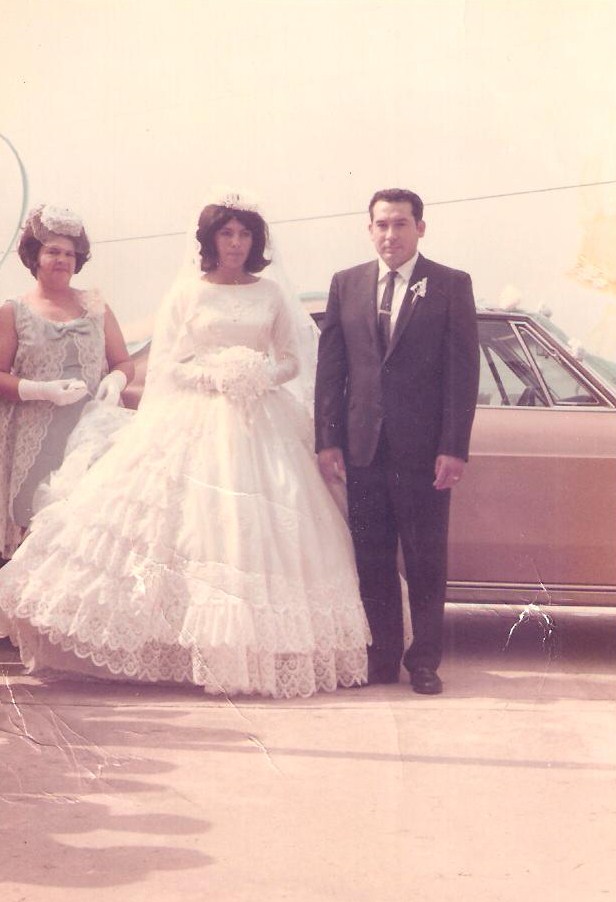
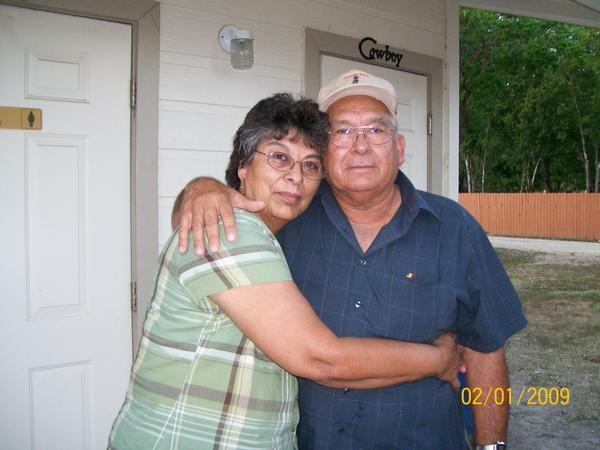
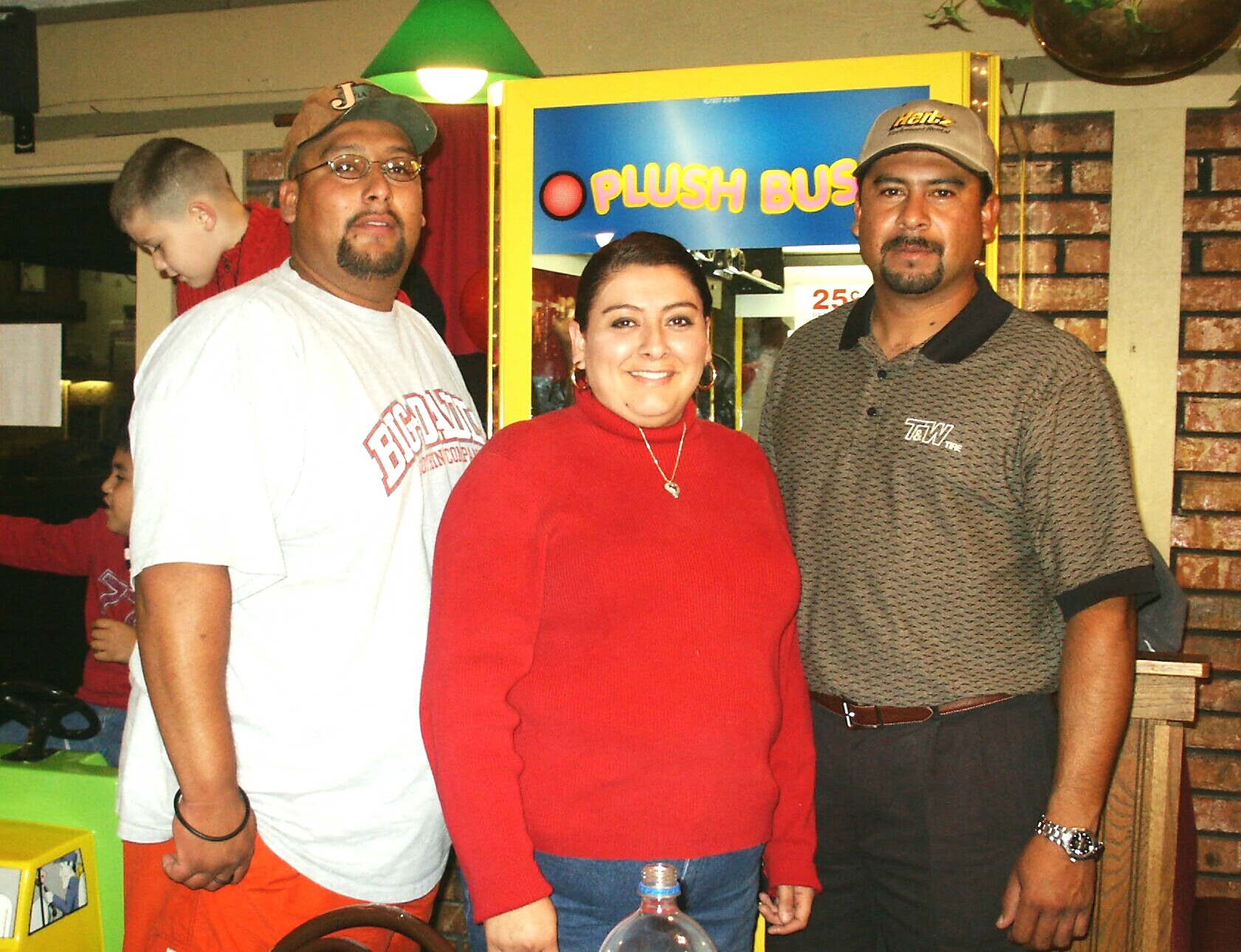
Explain your stuggles or achievements you had with dad?
Your father was the oldest of his family; you can say that he was like the father. His mother took it very hard when he decided to get married. After we got married, we lived with his mother for two days and I had a misunderstanding with my mother-in-law and your dad decided to leave to Adrian Michigan with your dad's uncle to go find work. We only had $67.00. Your dad asked his father for help to get there and he lend him his credit card, but told him that as soon as we arrived in Michigan to mail him back the card along with the money that we used. Your dad had to ask his Uncle to loan him $100.00 and he sent his dad back the card and the money. Your dad started to look for work, but he could not find anything anywhere. Finally your dad found work with a man who hired him to pick up stones with a wheel barrel. He only was able to do that for one week before he quit. He decided to call the ranch owner of the place where he had worked the year before. The ranch owner told him to come work for him immediately because he knew that your dad was a good mechanic and he knew how to work in everything, so we left Adrian Michigan to Redwood Minnesota. We lived in a small house there on the ranch but since another family was going to arrive to work the fields on that property we had to move out of the small house and stay in a small chicken cope. We were newlywed and we lived in a chicken cope. The ranch owner had chickens on the property at one time. They were small. The ranch owner added a bathroom for men and one for women beside the chicken cope. Your dad and I fixed up the small shack. He placed a piece of plywood to divide up the small chicken cope into two rooms. One room was the place where we would sleep and the other where we had a tiny stove to cook along with a small refrigerator. We lived there for two months, finally when the other family that lived in the small house came back to Texas we relocated into the house. We eventually came back to Carrizo and we rented a house in town. The owner was renting this house to us for three months with option to buy after. They told your dad to go ahead and fix it up. I was in very bad shape. So your dad fixed it up but, when it was completely fixed the landlord told us that he changed his mind about selling it to us and evicted us. So we left up north and by then I was expecting your brother who was born in July in Springfield, Minnesota. We had many down falls and many bad times but your father and I finally agreed that even if we did not have anybody surrounding us from our families we had our children. Our children were our world. I always say to myself that having my children I have everything. I don't need anybody else. Your dad work so so so much. Certain people were always telling him that he was going to get married and he would never have anything and so your dad set out to prove them wrong. We worked hard, always together in what ever even in the fields knowing that he was a mechanic by trade we would go work in the sugar beets, cleaning beans where just a few. If I recall right back then they were paying us $13 per acre which equals to 13 rows, close to a mile. It would take us from six in the morning to four in the afternoon to complete 13 rows. We did what ever it took to survive. At one point we even lived with my parents, your dad made all the cabinets in my parent's house as a way to work off our rent. We lived for five months with them; they were the ones who gave us shelter after nobody else would. Then we rented a house and we would go up north to work in the sugar beets. We had to work hard to pay off the car he had bought right after we got married because we owed it. Your dad would work and would save money one way or another. Your dad is the man he is today because of what he saw and suffered. He has no bad habits. He eventually bought some acres in town on 13th street and had someone move him a small beat up house and placed it on one corner of the property. You could see sunlight threw the walls. Your grandfather made a shop out of aluminum to do mechanic work out of it on the other end of the property because he was separated from my mother-in-law and he could not work out of his house where he had his shop at that time. Your dad told his father to come work out of ours so he brought all his equipment and tools. Your dad would get mechanic work and use your grandfather's tools. I was expecting you by then. Little by little your dad built the house that now sits on that property. He would work on it in the evenings after he had worked in the shop all day. I would help him as much as I could. We eventually sold that home and moved out to where we live now and I'm happy. We have come a long way. We have a home, vehicles and land that are all paid for. We owe nobody. We have been truly blessed
Is there anything else you would like to add to this interview?
Thank you for picking me. These are stories that I have never told in my whole life. Look at how old I am. As far as when I was in Mexico and when I was a young, there was so many poor people and yet there was many who had ways to do things. In those times we were happy because that was our life we didn't know any other way. There was no asking for this or that…..you didn't ask for nothing….nothing. Maybe that why I am the way I am…I got married and even though I have mentioned things off the record and suffered dearly you can still stay that thank God I am well Because I was blessed with a hard working man who has always tried to have everything for me and my children. Now that we are older we have left all the bad stuff aside to be more united and at peace. That's the way my life has been. I don't complain about anything right now. What can I say…..I have my three children and my grandchildren. I don't want anybody to go threw what I went threw. Now there is so much help out there for people who are disadvantaged….there is so many programs…like food stamps and housing and such all you have to do is look for help and someone will help you. As where in Mexico from where I am from that only have one meal per day. Nothing has changed. I enjoyed doing this with you..I had a chance to vent because you know very well that I am a very private person. It's sad because everything came back to me and I re-lived it. I am so proud of you that you are going to school to further your education. I am proud of all three of my kids. I hope that you make a good grade too…..(laughing). I love you mija. Thank you …ok The End

